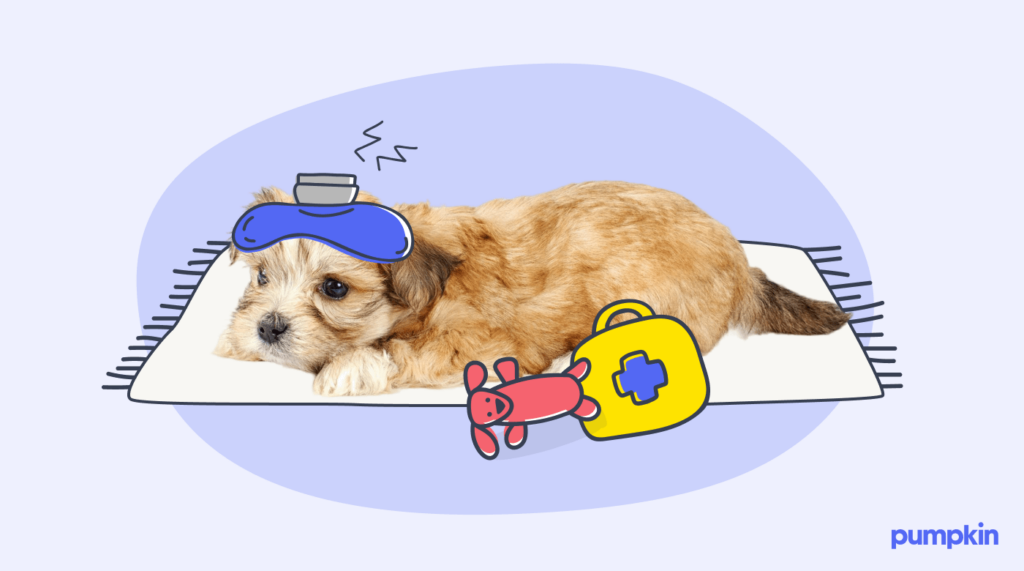Key Points
- You can protect your pet from a range of common puppy diseases through vaccination.
- Puppies are still growing and developing their immune systems, so illnesses are not uncommon.
- Some canine illnesses are highly contagious, including kennel cough and influenza.
When you adopt a puppy, you may be prepared for shoe-chewing, midnight toilet runs, and a special diet. But what you might not expect is your new dog getting sick.
A sick pup can be scary, especially for new pet parents. So, what do you do when you notice symptoms such as a loss of appetite, lethargy, vomiting, or diarrhea? There are a range of common puppy diseases, some of which require treatment from your veterinarian.
To prepare yourself, here are nine of the most common puppy illnesses. We’ll also cover their symptoms and the likely treatment options your pup will need to get back to their rambunctious self. Finally, don’t forget to read up on the puppy vaccination schedule! You can spare your puppy from a lot of common germs by getting them vaccinated.
1. Parvovirus (Parvo)
Parvovirus, also known as Parvo, is a deadly virus that typically affects young puppies and unvaccinated dogs. Most severe cases of illness occur in dogs between 6-16 weeks of age.
Parvo attacks rapidly dividing cells in the body. This means that your dog’s intestinal tract and bone marrow are at the most risk. Symptoms are usually related to problems with the gastrointestinal tract, dehydration, and suppression of the immune system.
Dogs become infected when they accidentally ingest the virus. Parvovirus isn’t airborne, but it can be found on surfaces.
It’s usually spread through accidental ingestion of contaminated fecal material. Gross, right? The tricky part is that it’s not just found in solid pieces of poop but also on contaminated surfaces such as the ground, shoes, kennels, or even on a dog’s fur and paws.
Symptoms of parvovirus in dogs include:
- Lethargy
- Lack of appetite
- Fever
- Vomiting
- Diarrhea
- Dehydration
- Hypothermia
Parvovirus prevention and treatment
The best way to prevent parvovirus is through vaccination. If your puppy develops symptoms associated with parvovirus, seek immediate attention.
This virus is almost 100% fatal without treatment. If your new puppy has been diagnosed with this disease, your veterinarian may prescribe inpatient treatment at an animal hospital, antibiotics, or IV fluid therapy.
2. Distemper
Canine distemper affects the respiratory system, gastrointestinal tract, eyes, and nervous system. It’s an airborne virus but can also spread through blood, urine, and saliva.
Distemper can lead to pneumonia or neurological problems associated with brain injury.
Symptoms of distemper include:
- Sneezing
- Eye discharge
- Upper respiratory issues
- Loss of appetite
- Lethargy
- High fever

Due to these symptoms, distemper is often mistaken for a cold until it gets much worse.
Distemper prevention and treatment
If not prevented with vaccinations, your puppy may need to be hospitalized. It usually takes weeks to fully recover from distemper, along with medications to continue at home.
This disease can become dormant and then arise later when your pup is older, and about 80% of puppies infected with distemper will die. That’s why — as is so often the case — prevention and vaccination are the best possible treatments for canine distemper.
3. Kennel cough
As one of the most common puppy illnesses, kennel cough is extremely contagious. It’s very common in places where there are lots of dogs all in one space, like dog shelters, doggy daycares, boarding facilities, and dog parks.
Kennel cough is a respiratory disease caused by multiple bacterial and viral pathogens, most often Bordetella bronchiseptica. It’s spread through airborne droplets, direct contact (such as touching noses), or contaminated surfaces (including water and food bowls).
It’s easily treated but can cause more severe coughing in puppies under 6 months of age and in immunocompromised dogs.
Signs of kennel cough include:
- A dry, gagging, retching, or hacking cough
- Pneumonia
- Lethargy
- Fever
- Difficulty breathing
Prevention and treatment
Kennel cough isn’t fatal and most dogs recover well with treatment. They may even recover on their own without intervention. There is also a Bordetella vaccine that can help protect your pooch.
For mild cases of kennel cough, a sick puppy can recover with a few weeks of rest. However, more severe cases will require cough medicine and an antibiotic. It usually takes about 14 days for a puppy to recover, but this will vary by case.
4. Adenovirus
Adenovirus causes upper respiratory tract infections and infectious canine hepatitis. Thankfully, this virus isn’t seen too often thanks to widespread puppy vaccinations.
There are two types of this virus. Canine Adenovirus 1 is spread through direct contact with feces, urine, or eye discharge. Canine Adenovirus 2 is spread through coughing or sniffing infected pups.
Signs of Adenovirus include:
- Fever
- Vomiting
- Diarrhea
- Abdominal pain
- Liver damage
Adenovirus prevention and treatment
If your puppy contracts Adenovirus, they will often require hospitalization for treatment, and there are typically long-term health complications. You can avoid Adenovirus with proper vaccination.
5. Leptospirosis
Leptospirosis is a bacterial infection, often transmitted from infected wildlife through contaminated water and infected urine.
It spreads through the bloodstream, affecting the kidneys and liver. Humans are also at risk of a leptospirosis infection.
Signs of leptospirosis in dogs include:
- Lethargy
- Fever
- Vomiting
- Diarrhea
- Increased drinking and urinating
- Muscle soreness
- Rapid breathing
Leptospirosis prevention and treatment
If your puppy has contracted leptospirosis, they may need to be hospitalized for treatment and antibiotics for up to 4 weeks or more.
You can get your puppy vaccinated to help prevent this disease when they are 10-12 weeks old, and then again when they are 13-15 weeks old.
6. Influenza
Canine influenza is also known as the “dog flu.” It creates an acute respiratory infection transmitted through droplets from coughing, barking, and sneezing.
Influenza can also spread through contaminated objects like food and water bowls, kennels, collars, and leashes.
The good news? The canine flu virus isn’t the same as the one that gets humans sick, so you won’t catch the flu from your dog, and vice versa.

Signs of canine influenza include:
- Coughing
- Fever
- Runny nose
- Lethargy
Because of these symptoms, it can easily be mistaken for kennel cough.
Canine influenza prevention and treatment
Unfortunately, doctors still haven’t cured influenza in humans, nor veterinarians in dogs. However, veterinarians can offer supportive treatment to help with the symptoms. Your vet may also give you quarantine instructions for your sick puppy to avoid spreading the flu any further.
If your puppy is at high risk for being exposed to canine influenza — such as show dogs or dogs that frequently use doggie daycare — vaccination is available for both types of canine influenza (H3N2 and H5N5).
7. Parasites
Common internal parasites in dogs include hookworms, heartworms, roundworms, and tapeworms.
They can be picked up from a range of sources, such as infected dogs, eating a dead animal, dog feces, or contaminated soil.
Different intestinal parasites will show different symptoms, but common signs of parasites in dogs include:
- Diarrhea
- Vomiting
- Weight loss
- Dull coat
- Pot-belly appearance
- Lethargy
- Abdominal pain
- Coughing
- Bloody stools
- Itching around the anus area
You may also see worms in the stool or vomit.
Parasite prevention and treatment
Your veterinarian will typically give your sick puppy a deworming medication as well as a preventative medication. Regular parasite prevention is critical for all your pets, and with a little proactive care, you can help them avoid worms and other pests.
8. Ear infections
Ear infections can be painful for your pet. They are common in dogs and often affect pups with long ears, such as Labrador Retrievers. Your dog may experience an outer, inner, or middle ear infection.
This condition can be genetic, and certain breeds are also predisposed to ear infections. However, moisture, ear mites, or hypothyroidism can also be a cause.
Signs of an ear infection in dogs include:
- Head shaking
- Ear discharge
- Scratching
- An unusual odor
- Loss of balance
Ear infection prevention and treatment
Moisture can cause yeast to grow, resulting in an infection, so the best way to prevent this condition is to keep the area dry. If the vet diagnoses an underlying cause, such as a bacterial infection, medication may be prescribed.
Your veterinarian may also recommend diet changes, as certain types of food allergies can contribute to ear infections. Your vet may also recommend regularly cleaning your dog’s ear or an allergy elimination diet.
9. Urinary tract infection
If your puppy is having difficulty going number one, they may have a urinary tract infection, another common puppy illness. It’s triggered when bacteria gets into the bladder, usually from feces that contains E. coli.
Female dogs are more likely to get a UTI than males. Dogs with bladder stones can also be prone to the condition.
Signs of a canine UTI include:
- Bloody urine
- Cloudy urine
- Increased urination
- Crying during urination
- Accidents
- Lethargy
- Fever
- Excessive licking “back there”
You should call your vet straight away if you think your dog has a bladder infection.
UTI prevention and treatment
Most UTIs are easy to treat. Your vet will usually take a sample of their urine and prescribe a course of antibiotics.
Why do puppies get sick?
Puppies get sick for a variety of reasons. Their immune system is more immature than adult dogs, and they may be too young to get vaccinated against common puppy diseases. Plus, our youngest dogs explore with their mouths, which means they can bite and chew poisonous plants, contaminated surfaces, and dangerous human foods.
While taking your puppy to their annual exam, getting their recommended vaccines, and preventative treatment are all important, true wellness is also about supporting their health and happiness in everyday life.
If your dog has an accident or illness, a trip to the vet can save their life. And there are vaccines available you can use to protect your dog. Pumpkin Pet Insurance plans can also help cover the costs of eligible vet bills in the future, giving you one less thing to worry about when the unexpected happens.




